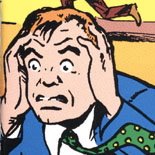Really?
So there's a petition to save J'onn J'onzz, the Martian Manhunter, from being killed in an upcoming crossover.
To say I think this is stupid is probably pretty obvious.
First off, there's the fact that he's a fictional character, and his death will have ZERO consequences in the real world.
Then there's the fact that, even in the DC Universe, his "death" is unlikely to be anything permanent. He's a brand character with forty years of history, a role in the justice league (sage advisor) that just isn't filled by any other character, and a huge fondness with fans and creators alike.
Plus he's an alien, shape-shifting, psychic. Which is three plausible resurrection strategies right there. Add in non-character saves like time-travel and clones, and you're looking at a guy who just won't stay dead.
All of which is besides the point. The point is this is a petition against the possibility of J'onn J'onzz being killed. This isn't trying to bring back a forgotten character, or be given a bigger role. The petition wants J'onn J'onzz to never even appear to be in any real danger of dying.
Well, doesn't that just rob any story about him of any drama? If we know that J'onn can't die, why do we care?
Yes, I wasn't happy when the Bart Allen Flash died, but that was because the solicitations basically said, "In this issue, Bart Allen dies." There was no suspense, just a joyless death march, which made for a terrible story. If this petition were successful, I'd be just as unhappy for the same reason. Without the possibility of death, the possibility of failure, the story is just boring.
Which is, basically, what this petition is. It's a plea to DC not to kill a beloved character, at the cost of drama and plot. "Please, Mr. Didio, don't threaten me with unhappy endings. I just don't know if I can take it."
Look, there's lots of causes regarding superhero comics I fully support. I would love to see new female and minority characters, and better writing for the ones that already exist. I'd like to see more support for less "mainstream" books and self-contained, new reader friendly books (basically, please please please keep Blue Beetle and Manhunter going). I even support the return of characters that were "loaned" to Vertigo fifteen years ago.
But I can't support the preservation of the status quo just so some schmoe can keep his imaginary best friend.
p.s. the other character rumored to be killed along with the Martian Manhunter is Aquaman. Who is already dead right now. And no one cares!


